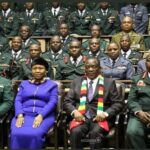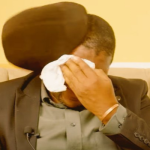In an unprecedented incident that marred the closing remarks of Finance Minister Mthuli Ncube’s 2025 national budget presentation, Parliament has issued an apology to President Emmerson Mnangagwa and the nation following a power outage at the New Parliament Building. The blackout occurred just as Ncube was concluding his speech, plunging the chamber into darkness and leaving the President to be escorted out of the building amid confusion.
As the lights went out, Parliament’s backup generators took their time to activate, further heightening the embarrassment of the situation. ZESA spokesman George Manyaya promptly addressed the media, refuting claims that the power outage was due to load shedding.
“There was a storm in the parliament area and unfortunately lightning caused a temporary loss of power during the budget presentation. It’s an act of nature and definitely not load shedding as is being suggested on social media,” he explained.
In a statement following the incident, Parliament acknowledged the severity of the situation and apologised directly to Mnangagwa. They noted that thunderstorms and high winds had affected overhead lines, leading to a trip at a 132kV feeder that supplies power to a substation, which in turn feeds the Mt Hampden area. The disruption also impacted surrounding areas at around 3.25 PM, coinciding with the peak of Ncube’s presentation.
The malfunction of the standby generator in the building contributed to the unfortunate event. Parliament stated that the power surge caused the generator to lose its memory settings, rendering it ineffective during the crucial moments of the budget presentation. This incident unfolded at a time when all eyes were on Zimbabwe as it sought to navigate its economic challenges through the national budget.
Zimbabwe has been grappling with severe power shortages that have left both businesses and households facing daily outages. The recurrent power crises have often been attributed to declining water levels at Lake Kariba, the country’s primary source of hydroelectric power. However, this recent blackout has thrown into sharp relief the failures of Zimbabwean authorities to devise lasting solutions to the ongoing energy crisis.
As the lights flickered out, opposition MPs from the Citizens Coalition for Change seized the moment, chanting “magetsi azviramba” (electricity is refusing) and “state of affairs,” expressing their frustration over the persistent energy woes. One MP even shouted, “The House is under attack,” highlighting the political tensions surrounding the incident.
Zimbabweans currently endure power cuts lasting up to 18 hours daily, exacerbating economic difficulties amid rising inflation and a struggling economy. ZESA’s inability to meet the national demand for power has come under scrutiny, especially as data from the Zimbabwe Power Company revealed that the country was generating only 1,083 MW of power on Wednesday, while the demand stood at approximately 2,000 MW.
In his budget speech, Ncube acknowledged the impact of the power deficit on the economy, stating that it was “weighing down on production and the competitiveness of the economy.”
He projected that power generation would increase by 10.6 percent in 2025, reaching 10,000 GW, but this would still fall short of the projected demand of 19,000 GW. This anticipated growth in power generation is expected to hinge on the reliable performance of Hwange units 7 and 8, as well as additional contributions from renewable energy sources developed by independent power producers.
The timing of the blackout could not have been more detrimental, overshadowing the critical discussions around Zimbabwe’s economic recovery and budgetary plans.












